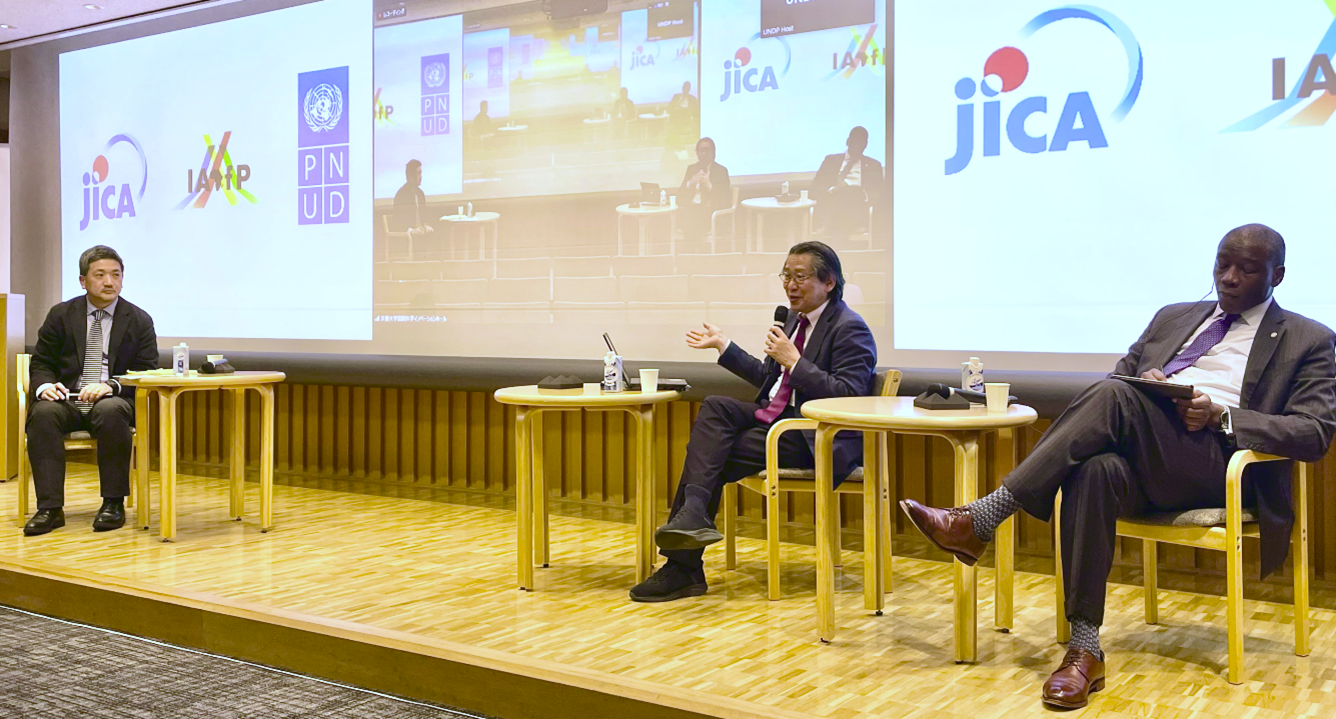【Event Report】AFRI-CONVERSE 2024 #01 'Africa 2063: Unpacking the Potential of MSMEs and Championing Grassroots Ingenuity’
2024.04.26

At AFRI CONVERSE 2024 #1 on March 15th 2024, under the theme 'Africa 2063: Unpacking the Potential of MSMEs and Championing Grassroots Ingenuity’, key stakeholders discussed the potential of micro, small and medium enterprises and entrepreneurs (MSMEs) to support local economies in the run-up to the TICAD Ministerial Meeting and TICAD 9.
Africa has shown rapid economic growth in recent years. In this context, the informal sector, in which MSMEs make up the majority, is also attracting attention. In sub-Saharan Africa, around 85% of the workforce is engaged in the informal sector, encompassing a large portion of the region's young workforce. These locally based enterprises are building a foundation for sustainable growth by responding flexibly to local needs and building community cohesion.
At the outset of the event, Mr. Shuhei Ueno, Deputy Director General of JICA's Africa Department, highlighted the importance and potential of local business based on his experience in Tunisia. Mr. Ueno then moderated a discussion focusing on the potential of MSMEs and entrepreneurs to support the local economy.
Ms. Faiza Shems, CEO and co-founder of BINA PADS (Ethiopia), shared her journey in creating a business that produced sanitary napkins from naturally derived materials. Since the sanitary napkins distributed in the market are primarily made from plastic (an expensive product for community residents) and thus undegradable, their disposal leads to environmental degradation. Ms. Shems’ business contributes to the sustainable growth of the local economy by making napkins that are inexpensive and environmentally friendly, and promoting female employment. She plans to improve the business skills of female employees, who make up 70% of its workforce, and to expand BINA PADS’ product range (e.g. nappies).
Ms. Angela Ahadome of the Boston Consulting Group mentioned the role of the Home Grown Solutions (HGS) accelerator, promoted by JICA, the Boston Consulting Group and AUDA-NEPAD. The HGS Accelerator is a programme that aims to create locally initiated solutions for healthcare, for which Africa has been externally dependent in the Corona Disaster. Based on the goals of Agenda 2063, the programme provides needs assessments for individual businesses, funding support and partner matching in each sector to support 28 related industries in 30 countries.
Professor Motoki Takahashi of Kyoto University's Graduate School of Asian and African Area Studies explained the structural transformation of the African continent and the ingenuity of MSMEs. He expressed alarm about the challenge that the so-called 'Missing Middle’, in which the informal sector in Kenya is growing horizontally in number without becoming larger in its scale, poses towards economic growth. Acknowledging that Africa’s level of industrialization remains low, and its structural transformation is not progressing as fast as it should, he emphasized the importance of non-capitalistic phenomenon in which new inventions and knowledge are not patented to generate profits but disseminated freely among fellow entrepreneurs in the informal sector and on the basis of the understanding. He advocated that their craftspersonship and ingenuity should be respected and that strategies should be designed to connect them to technological innovations and industrial development.
Dr. Raymond Gilpin, Chief Economist of the Strategy, Analysis and Research Team at the UNDP’s Regional Bureau for Africa, stressed the significant impact that MSMEs have on income and employment generation. Touching upon challenges such as the high cost of investing in the informal sector, he stressed the need to re-examine the ecosystem and unlock its potential through policy interventions such as facilitating access to technology and finance. He pointed out that partnerships with technology-driven countries including Japan could be effective in scaling up MSMEs.
![]()
Professor Motoki Takahashi
of Kyoto University's Graduate School of Asian and African Area Studies
![]()
Raymond Gilpin
, Chief Economist of the Strategy, Analysis and Research Team at the UNDP’s Regional Bureau for Africa
![]()
Mr. Shuhei Ueno
, Deputy Director General of JICA Africa Department
The discussion that followed underscored the importance of basic education in promoting local business ingenuity. Properly educated entrepreneurs can create products tailored to local needs, and the spread of these standards throughout the community can lead to business expansion. Furthermore, it was highlighted that policy and financial support from government and development agencies is necessary for MSMEs to expand their business. Such partnerships provide access to adapted technologies and markets that encourage the growth of SMEs. In addition, the discussion emphasized the importance of facilitating access to commercial platforms through investor funding and encouraging the flow of funds and financing facilitating through legal and regulatory arrangements.
AFRI CONVERSE 2024 #1 highlighted the importance of the potential of African MSMEs and their impact on the local economy, with the hope that Africa’s future will be shaped from within, with MSMEs playing a pivotal role.
scroll